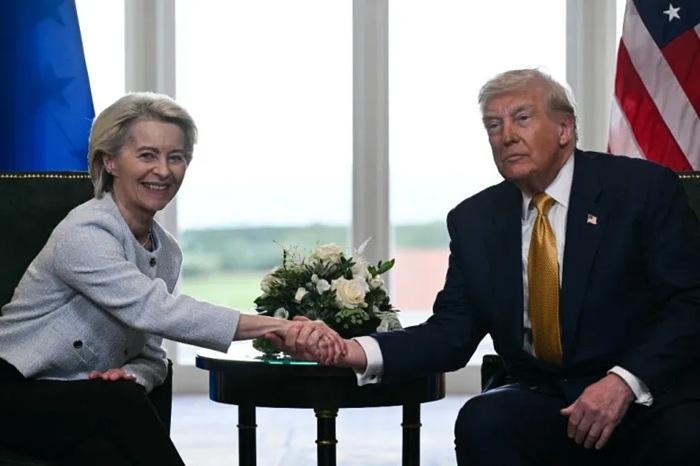
The United States and the European Union have reached a wide-ranging trade agreement, averting a full-blown transatlantic trade war days ahead of an August 1 deadline for the introduction of steep tariffs.
The deal, which imposes a 15 percent tariff on most European goods, came after a private meeting on Sunday between US President Donald Trump and European Commission President Ursula von der Leyen in Scotland.
“It was a very interesting negotiation. I think it’s going to be great for both parties,” Trump told reporters at his Turnberry golf resort, hailing the agreement as the “biggest deal ever made”.
Von der Leyen said the agreement would “bring stability” and “bring predictability that’s very important for our businesses on both sides of the Atlantic”.
The deal, sealed days before Washington was due to impose a 30 percent tariff on EU imports, is the most significant of Trump’s trade deals announced so far, following preliminary pacts with Japan, the United Kingdom, Indonesia, Vietnam and the Philippines, and a 90-day trade truce with China.
The EU is the US’s largest trading partner, with two-way trade in goods and services last year reaching nearly $2 trillion.
Under the deal, the 15 percent tariff will be applied broadly to European exports, including automobiles.
The 15 percent baseline rate marks a reprieve for Europe’s auto industry, which had since April been subject to a 25 percent duty on top of a pre-existing 2.5 percent levy.
Under the agreement, a limited range of goods, including plane parts, semiconductor equipment, certain chemicals and some agricultural products, will be fully exempt from tariffs.
Trump said the EU also committed to buying about $750bn worth of US energy, in addition to boosting overall investment in the US by $600bn and placing a large order for military equipment.
“We have the opening up of all of the European countries,” Trump said.
Still, few details were included in the announcement.
“The big caveat to today’s deal is that there is nothing on paper, yet,” Carsten Brzeski, Global Head of Macro for ING Research, said in a note.
“The next hours and days will hopefully bring more clarity, Therefore, any assessment has to be taken with more than only one pinch of salt.”
The breakthrough follows months of tense back-and-forth exchanges between European officials and Trump, who has long accused the EU of unfair trade practices.
Just before negotiations began, Trump called the existing arrangements “a very one-sided transaction; very unfair to the United States”.
On Sunday, Von der Leyen pointed to the combined economic might of the US and Europe, saying that their trade encompassed “hundreds of millions of people and trillions of dollars”.
Von der Leyen also acknowledged Trump’s “tough” reputation as a negotiator, to which he replied: “But fair.”
Trade conflict averted
Earlier this month, negotiations appeared close to collapse when Trump threatened to proceed with the 30 percent tariff unless the EU matched the 15 percent rate he recently agreed to with Japan.
Asked if he would accept anything lower, Trump flatly said, “No”.
In anticipation of the possibility that the sides could fail to reach a deal, Brussels had prepared a long list of retaliatory tariffs targeting everything from beef and beer to Boeing aircraft and car parts.
German Chancellor Friedrich Merz welcomed the agreement.
“This agreement has succeeded in averting a trade conflict that would have hit the export-orientated German economy hard,” Merz said in a statement.
“This applies in particular to the automotive industry, where the current tariffs of 27.5 percent will be almost halved to 15 percent.”
Italian Prime Minister Giorgia Meloni said it was “positive” that a trade deal had been reached, but she would need to see the details to properly judge the agreement.
Other European lawmakers were more critical.
Danish MP Rasmus Jarlov said the announcement was “nothing to celebrate”.
“Almost everything will become more expensive in both Europe and the USA, and we will all be worse off,” Jarlov, a member of the Conservative People’s Party, said on X.
“The economic illiteracy in the White House is doing serious damage to the West.”
Trump, who is in Europe until Tuesday, is scheduled to meet UK Prime Minister Keir Starmer on Monday for talks that are also expected to focus heavily on trade.
While a separate US–UK trade framework was unveiled in May, many elements of the agreement have not been clarified.
On Tuesday, Trump will travel to Aberdeen to open a third golf course under the family name before departing for Washington later in the day. (Al Jazeera)
